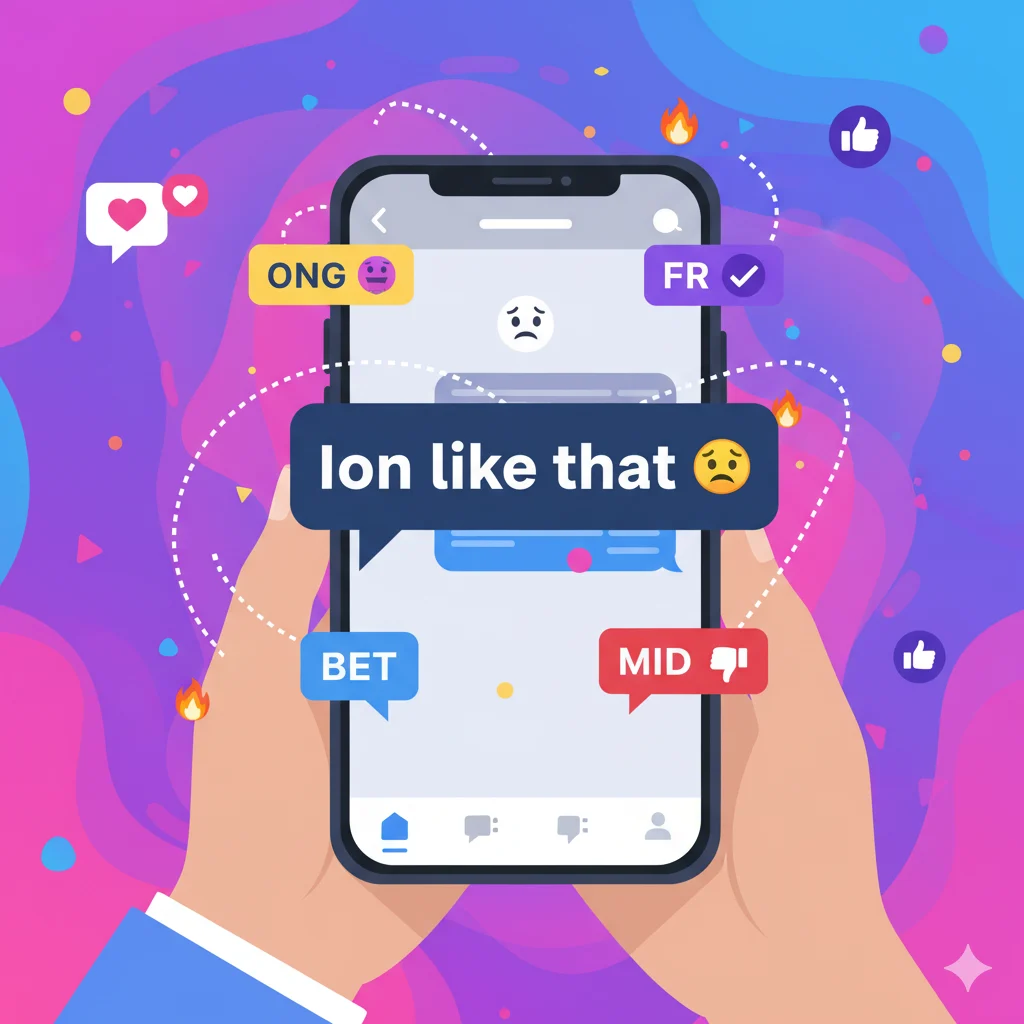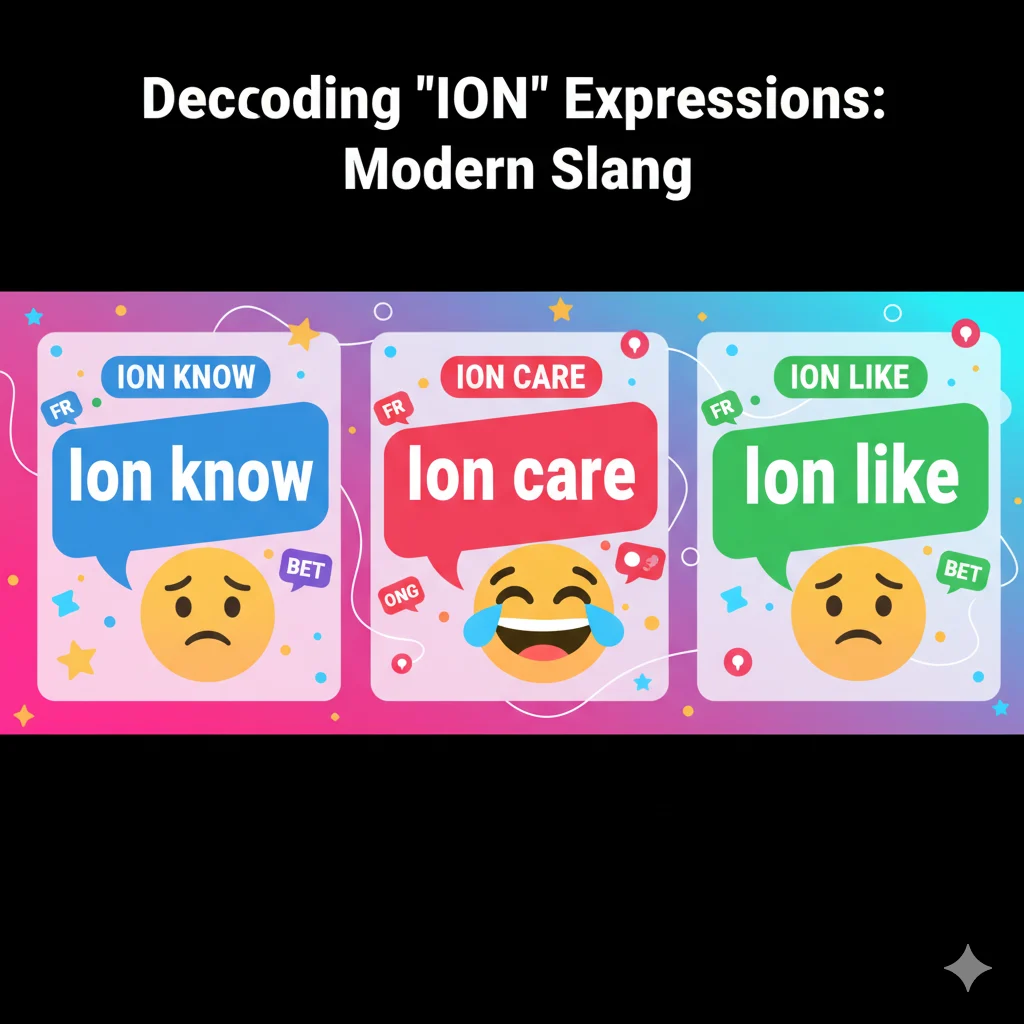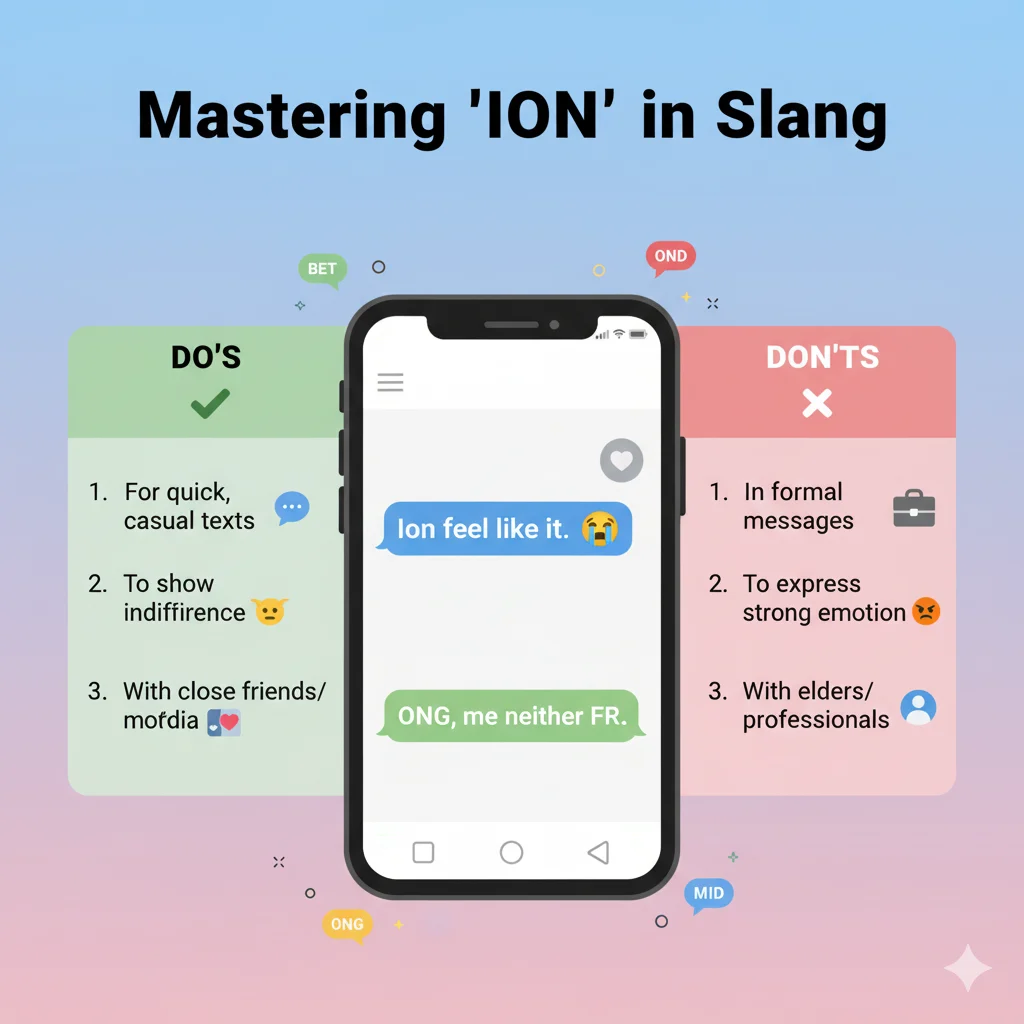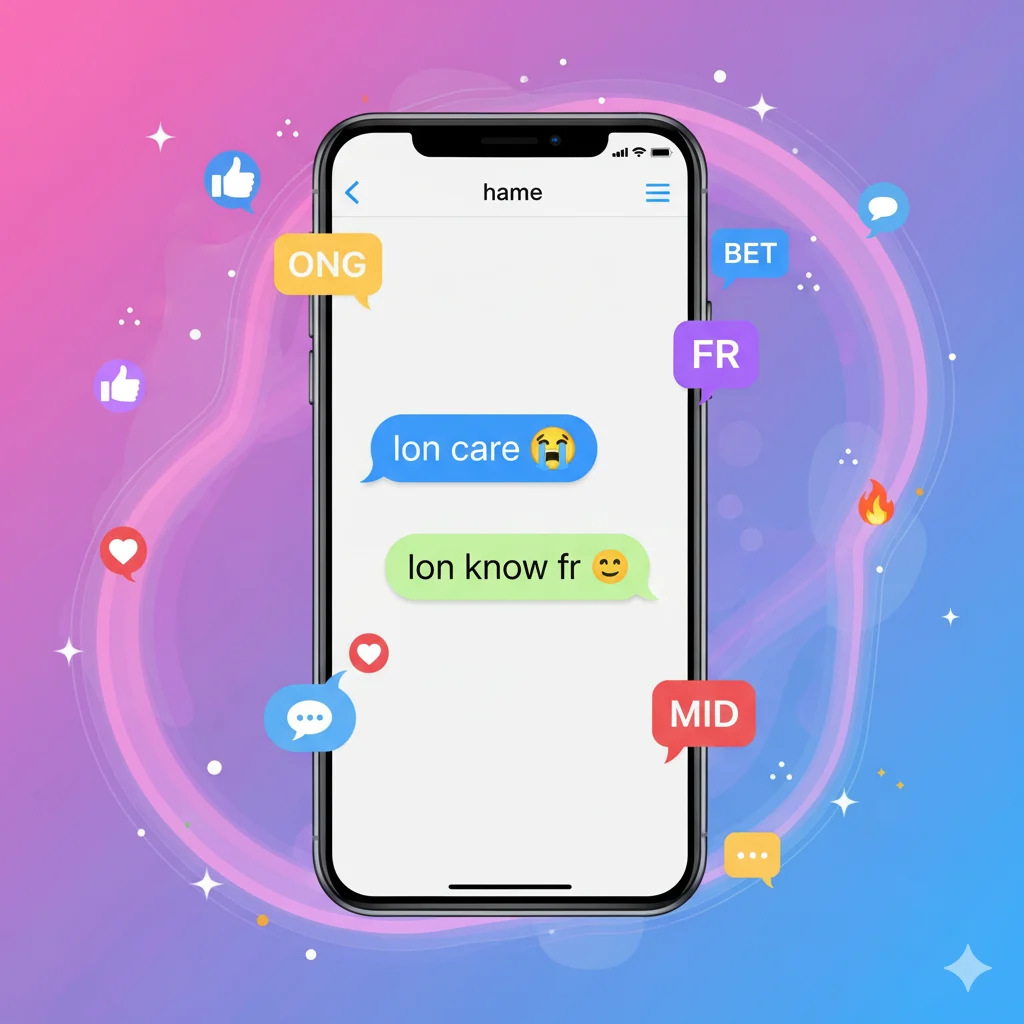Ever seen someone text, “ION know” or comment “ION care 😭” and wondered what it means?
You’re not alone — slang on the internet evolves faster than any dictionary can keep up with.
One of the most popular short forms popping up across TikTok, Snapchat, and X (Twitter) right now is ION — a tiny word with a big presence.
At first glance, “ION” might look like a science term (an atom with an electric charge), but in slang, it means something completely different.
Let’s break down what ION means in slang, how it’s used in real conversations, where it came from, and how you can use it confidently without sounding out of touch.
What Does “ION” Mean in Slang?
In slang, “ION” is short for “I don’t.”
It’s a phonetic spelling that imitates how people pronounce “I don’t” quickly in speech — like “Ion know” for “I don’t know.”

It’s most commonly used in texting, social media captions, memes, and online chats to sound casual or expressive.
Let’s see some quick examples:
- “ION like that.” → I don’t like that.
- “ION care.” → I don’t care.
- “ION even know her fr.” → I don’t even know her, for real.
👉 In short: “ION” = “I don’t.”
It’s informal, expressive, and part of today’s fast-paced digital communication.
Where Did “ION” Come From?
The slang “ION” comes from the phonetic contraction of “I don’t.”
People started typing it how it sounded in conversation — especially in African American Vernacular English (AAVE). Over time, it spread widely through social media, hip-hop lyrics, and meme culture.
The pronunciation “Ion” (eye-own) mimics how people say “I don’t” quickly without the “t.”
For example:
“I don’t know” → “Ion know.”
“I don’t care” → “Ion care.”
This style of shortening words is common in slang — similar to “finna” (for “fixing to”) or “tryna” (for “trying to”).
It’s efficient, natural, and expressive — the core of how internet slang evolves.
How “ION” Became Popular Online
The popularity of “ION” exploded thanks to social media and music culture.
1. TikTok & Twitter (Now X)
Users often include “ION” in captions or comments to express emotions casually:
“Ion trust nobody no more 😤.”
“Ion know why this song hit so hard 💔.”
TikTok videos and meme captions made it viral because it captures real feelings — frustration, carelessness, confusion — all in three letters.
2. Rap & Hip-Hop Influence
Artists in hip-hop frequently use “Ion” in lyrics. For example:
“Ion even care no more, I’m done with it.”
This made it more recognizable and normalized across generations.
3. Text Culture
People use “ION” in texts for speed and tone.
Typing “I don’t” feels too formal — “Ion” feels chill, emotional, and natural.
Common Meanings of “ION” in Slang
Although “ION” literally means “I don’t,” its meaning changes depending on context and tone.
Here’s how it’s used most often online:

1. I Don’t Know
Used to express uncertainty or confusion.
“Ion know what to do 😭.”
(I don’t know what to do.)
2. I Don’t Care
Used to show disinterest or nonchalance.
“Ion care anymore 💅.”
(I don’t care anymore.)
3. I Don’t Like
Used to reject or dislike something casually.
“Ion like that movie fr.”
(I don’t like that movie, for real.)
4. I Don’t Believe
Used when expressing disbelief.
“Ion believe he said that 😭.”
(I don’t believe he said that.)
5. I Don’t Want
Used for refusal or denial.
“Ion want no drama today.”
(I don’t want any drama today.)
Each one carries a slightly different emotional tone — from tired to funny to serious — depending on context.
Examples of “ION” in Real Conversations
💬 Text Chat:
A: “You going to the party?”
B: “Ion feel like it tbh.”
💬 Social Media Comment:
“Everyone hyping that movie, ion see what’s special 😭.”
💬 Meme Caption:
“Me pretending to care about drama I didn’t ask for — ion 🫠.”
💬 Music Lyrics:
“Ion chase no one, I just move on.”
These examples show how “ION” blends sound, feeling, and rhythm to express mood better than plain English ever could.
The Linguistics Behind “ION”
Slang like “ION” represents phonetic writing, where people spell words how they sound rather than how they’re formally written.
This phenomenon is common in:
- AAVE (African American Vernacular English)
- Internet shorthand
- Digital linguistics
For instance:
- “I’m not” → “Ion’t” → “Ion”
- “You all” → “Y’all”
- “Kind of” → “Kinda”
These aren’t mistakes — they’re creative adaptations of spoken language into written form, proving that slang reflects culture and expression.
Tone and Emotion Behind “ION”
Like most slang, “ION” isn’t just about meaning — it’s about tone.
It adds attitude, emotion, or energy depending on how it’s used.
| Emotion | Example | Tone |
|---|---|---|
| Frustration | “Ion got time for this 😤.” | Annoyed |
| Chill | “Ion even care fr.” | Calm/indifferent |
| Sad | “Ion know what’s wrong 😔.” | Emotional |
| Funny | “Ion know, man 😂.” | Playful |
| Confident | “Ion need nobody.” | Assertive |
That flexibility makes “ION” one of the most emotionally expressive slang words of the decade.
How to Use “ION” Naturally
To sound natural using “ION,” follow these simple tips:

✅ Use it at the start of a sentence — it usually replaces “I don’t.”
✅ Keep it lowercase — “Ion care” not “ION care.”
✅ Use emojis to match your tone.
✅ Avoid using it in formal messages or emails.
Correct Usage:
- “Ion like how that went down 😒.”
- “Ion believe it till I see proof.”
Incorrect Usage:
- “Do you ion like it?” (Grammatically awkward)
- “ION KNOW WHY???” (Overly capitalized)
“ION” vs. Similar Slang Words
| Slang | Meaning | Example |
|---|---|---|
| ION | I don’t | “Ion care.” |
| IDC | I don’t care | “IDC about that.” |
| IDK | I don’t know | “IDK what to say.” |
| FR | For real | “That’s true, fr.” |
| ONG | On God | “He funny, ong.” |
While “IDC” and “IDK” are acronyms, “ION” is phonetic slang — it captures how you’d actually say the words, not just shorten them.
Cultural Meaning and Social Influence of “ION”
“ION” reflects more than slang — it represents how digital communication and culture merge.
- Originating from AAVE, it carries rhythm, expression, and style that mainstream English often lacks.
- The internet amplified its reach, making it a global expression for youth culture.
- “ION” bridges speech and typing, proving how slang keeps communication authentic and human.
Today, “ION” is used worldwide, especially among Gen Z and Millennials, to express mood quickly and clearly.
Why “ION” Works So Well Online
“ION” thrives because it checks all the boxes of viral slang:
- Short and catchy — only 3 letters.
- Emotionally loaded — conveys tone.
- Visually simple — easy to type and read.
- Culturally rooted — authentic in origin.
People love it because it’s efficient. Instead of typing “I don’t,” you type “Ion” — and it sounds exactly how you’d say it in real life.
ION in Music, Memes, and Pop Culture
You’ve probably heard “Ion” in countless songs or seen it in trending captions like:
“Ion even text back no more.”
“Ion need validation from nobody 💯.”
“Ion like you but I act nice 😭.”
From TikTok edits to rap lyrics, “ION” has become a symbol of chill, confidence, and detachment.
It’s the ultimate word for “I’m unbothered but expressive.”
Pop culture often uses it to show independence or emotional distance — a defining trait of modern social slang.
Common Mistakes People Make with “ION”
🚫 Using it in formal writing:
It’s slang — not suitable for work or academic contexts.
✅ Use it in casual texts, DMs, or captions only.
🚫 Confusing it with science “ion”:
They’re pronounced differently in context — “ion” in slang = “I don’t,” not a charged atom.
🚫 Capitalizing or spacing wrong:
Avoid writing “I on” or “I’on.”
✅ Best format: “Ion.”
🚫 Overusing it:
It can sound repetitive or forced. Use naturally to enhance tone.
Regional and Social Use of “ION”
While “ION” is primarily popular in American slang, it’s now used globally thanks to the internet.
TikTok, Twitter, and Instagram users in the UK, Canada, and parts of Asia also use it in the same way.
In each region, it maintains its informal vibe — symbolizing a blend of attitude and ease.
For example:
- UK: “Ion care what he said, fam.”
- USA: “Ion got time for that.”
- Nigeria: “Ion even dey stress myself.”
The consistency shows its universal adaptability.
How “ION” Reflects Digital Linguistics
Slang like “ION” shows how language adapts to digital speed and emotion.
People type the way they speak — fast, emotional, and rhythmic.
Instead of rigid grammar, we now use phonetic authenticity.
This linguistic trend proves one key point:
Slang isn’t bad English — it’s evolving English.
“ION” demonstrates how online communities innovate to make communication more human, emotional, and efficient.
FAQs About “ION” Slang
Q1: What does “ION” mean in slang?
It means “I don’t.” For example, “Ion care” = “I don’t care.”
Q2: Is “ION” the same as “IDK” or “IDC”?
Not exactly. “ION” replaces “I don’t,” while “IDK” means “I don’t know” and “IDC” means “I don’t care.”
Q3: Where did “ION” come from?
It originated from AAVE and became popular online through social media and music.
Q4: Can I use “ION” in formal writing?
No — it’s purely informal slang meant for texting or online chat.
Q5: Is “ION” the same as the scientific term “ion”?
No. The slang “ION” and the scientific “ion” are completely different in meaning and pronunciation.
Conclusion: Why “ION” Defines Modern Internet Slang
“ION” may be short, but it captures the essence of how language evolves online.
It’s expressive, cultural, and emotionally charged — all in three simple letters.
From “Ion know” to “Ion care,” it’s more than a shortcut — it’s a voice, a mood, and a way of connecting.
It shows how people shape words to fit their reality, humor, and emotion.
So next time someone says “Ion care fr”, you’ll know exactly what they mean —
and maybe, you’ll start saying it too 👀.




